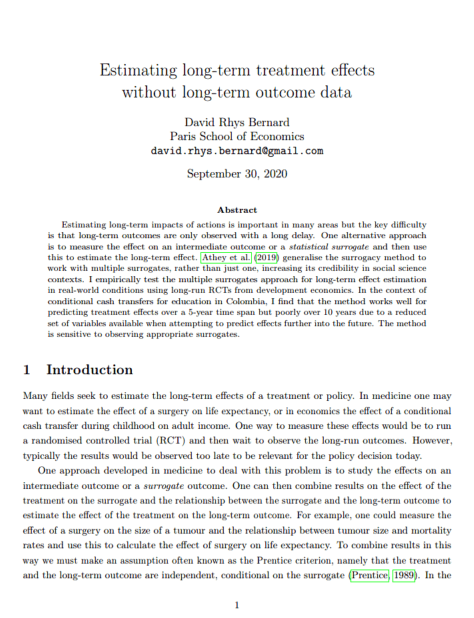Estimating long-term treatment effects without long-term outcome data
David Rhys Bernard (Paris School of Economics)
GPI Working Paper No. 11-2020
This paper has been awarded the paper prize of the 2019 Early Career Conference Programme.
Estimating long-term impacts of actions is important in many areas but the key difficulty is that long-term outcomes are only observed with a long delay. One alternative approach is to measure the effect on an intermediate outcome or a statistical surrogate and then use this to estimate the long-term effect. Athey et al. (2019) generalise the surrogacy method to work with multiple surrogates, rather than just one, increasing its credibility in social science contexts. I empirically test the multiple surrogates approach for long-term effect estimation in real-world conditions using long-run RCTs from development economics. In the context of conditional cash transfers for education in Colombia, I find that the method works well for predicting treatment effects over a 5-year time span but poorly over 10 years due to a reduced set of variables available when attempting to predict effects further into the future. The method is sensitive to observing appropriate surrogates.
Other working papers
The evidentialist’s wager – William MacAskill, Aron Vallinder (Global Priorities Institute, Oxford University) Caspar Österheld (Duke University), Carl Shulman (Future of Humanity Institute, Oxford University), Johannes Treutlein (TU Berlin)
Suppose that an altruistic and morally motivated agent who is uncertain between evidential decision theory (EDT) and causal decision theory (CDT) finds herself in a situation in which the two theories give conflicting verdicts. We argue that even if she has significantly higher credence in CDT, she should nevertheless act …
Maximal cluelessness – Andreas Mogensen (Global Priorities Institute, Oxford University)
I argue that many of the priority rankings that have been proposed by effective altruists seem to be in tension with apparently reasonable assumptions about the rational pursuit of our aims in the face of uncertainty. The particular issue on which I focus arises from recognition of the overwhelming importance…
Doomsday rings twice – Andreas Mogensen (Global Priorities Institute, Oxford University)
This paper considers the argument according to which, because we should regard it as a priori very unlikely that we are among the most important people who will ever exist, we should increase our confidence that the human species will not persist beyond the current historical era, which seems to represent…

